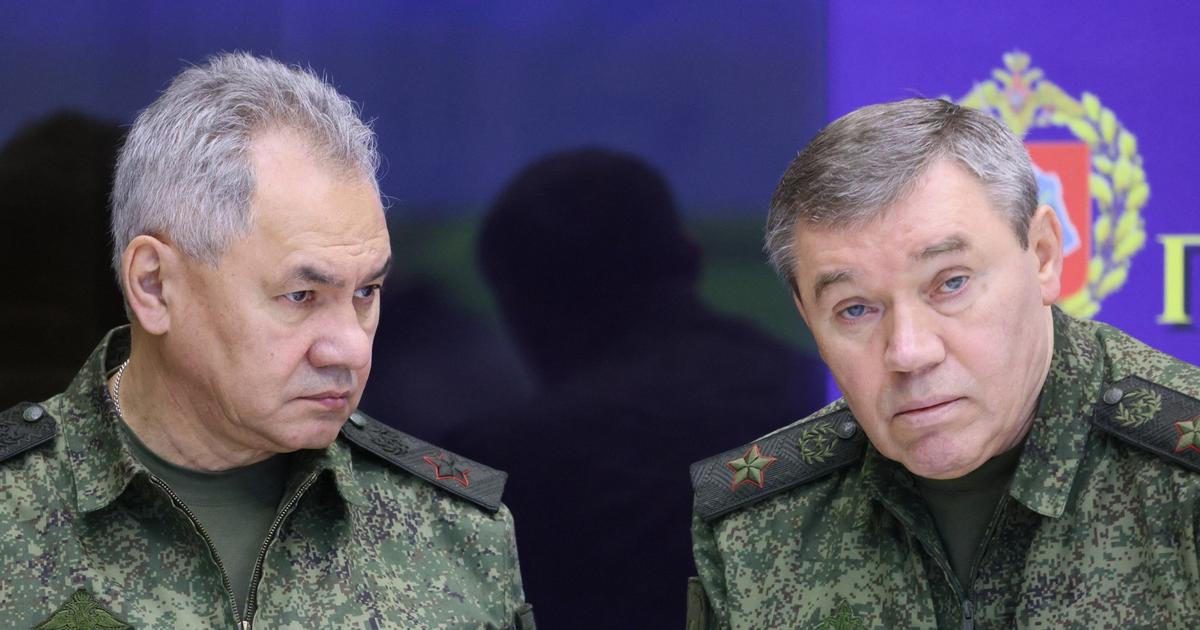Will 2023 be the year of great upheaval for the Russian army?
As of January 11, the command of the troops present in Ukraine changed hands, and was entrusted to the Chief of Staff in person, Valéri Guérassimov.
The first weeks of the year were also marked by several announcements from the Russian Defense Ministry.
While she thought she was waging a blitzkrieg, Russia has embarked on a long war, which she must now deal with differently.
To discover
Follow information on the war in Ukraine with the Figaro application
Last week, Minister Sergei Shoigu outlined the outlines of large-scale military reforms, which will be carried out between 2023 and 2026. His ministry also announced some more short-term directives, aimed at improving the professionalism of the armed forces without delay. , underlines the very serious American think tank Institute for the Study of War (ISW).
Among them, the prohibition for Russian soldiers engaged in Ukraine to use their mobile phone or a personal vehicle and... to wear beards.
Avoid further disasters
The ban on the use of electronic equipment for personal use in the army is theoretically already in place, but rarely respected.
With this measure, the Ministry of Defense wishes to avoid a new massacre, after the Ukrainian strike which had killed at least 89 Russian soldiers (400, according to the Ukrainian military authorities), in the heart of the temporary military quarters of Makiïvka on New Year's Eve .
Immediately after this attack, the ministry conveniently blamed it on Russian soldiers who used their cell phones to wish their loved ones a happy new year.
Read alsoThis Ukrainian strike that shakes the Russian army
These electronic devices would have allowed Ukraine to geolocate a large concentration of soldiers and strike with precision.
In the field, however, this equipment is used to fly reconnaissance drones and transmit intelligence.
"
Tablets and smartphones are essential to modern warfare
," Wagner boss Evgeny Prigojine said in an interview with Russian media.
Thanks to the data collected, the combatants know the general situation and can transmit vital information
”.
The prohibition of the beard, "
elementary aspect of military discipline
"
More anecdotally, the obligation to shave the beard is nevertheless indicative of the desire of the Russian high command to professionalize its army.
In its daily note dated January 16, the ISW points out that the issue of hygiene on the front lines has often been a point of friction between officers and their men, the latter often refusing to shave.
In an interview with the Russian news site RBC, relayed by Reuters, deputy and former high-ranking officer Viktor Sobolev considered that the ban on beards was an “
elementary aspect of military discipline
”.
“
A soldier is seen by civilians, he must look exemplary.
If he walks ungroomed and unshaven, it doesn't honor him either as a person or as a soldier
,”
A considerable portion of Muslims and Orthodox wear beards according to their religious customs.
Evgeny Prigojine on Telegram
“
This measure may seem trivial, but respecting or disregarding these standards is a marker of the professionalism of conventional troops
,” notes the ISW.
In underperforming and demoralized units, failure to meet these standards can fuel demoralization and poor performance
.”
Also according to the ISW, these directives could very well have been published “
with the aim of evaluating the effectiveness of the chain of command of the Russian army
”.
A freshly welcomed measure
But this measure was coldly welcomed, up to certain relatives of Vladimir Putin.
“
A soldier must fight.
80%
of the time, he washes himself with a bottle, and shaving is generally a great luxury
”, commented Evguéni Prigojine, again him, on his Telegram channel, describing these orders as “
absurd
” and “
archaic for years. 1960
”.
The Wagner boss also pointed out that “
a considerable part of Muslims and Orthodox wear beards according to their religious customs
”.
Read alsoRussia's permanent low-noise cyberwar
An argument taken up by Chechen President Ramzan Kadyrov, who saw in this directive a "
provocation
" against his soldiers, who are mostly Muslims, and an act of Islamophobia.
"
Sobolev knows full well who wears a beard on the front line and why
," he wrote on Telegram.
According to the Russian media RBC, the commander of a brigade of the separatist forces in Donbass indicated that this measure had in any case not yet had any repercussions on the ground.
"
We don't have such restrictions on the front line
," he said.
A more ambitious reform by 2026
Either way, "
these directives are likely part of deeper efforts by the Russian Defense Ministry to carry out widespread military reforms
," the ISW says.
In its note of January 17, the think tank indeed relays much more ambitious announcements, detailed by Sergei Shoigu in person and emanating directly from Vladimir Putin.
By 2026, Russia could thus institute “
large-scale changes
” in the composition, strength and administrative divisions of the armed forces.
Read alsoThese Russian bloggers who have the ear of Vladimir Putin
Thus, the Minister of Defense announced that the number of Russian soldiers should be increased from 1.35 to 1.5 million men and that the military districts of Moscow and Leningrad would be restored - which will bring the number of districts to six. .
Above all, a new army corps could be formed in Karelia, on the Finnish border, where the army of this northern country is on permanent alert.
New groupings of autonomous forces will also be deployed in Ukraine, according to the ministry, and the training of troops will be reinforced.
For the time being, and in the light of the major unfinished reform of the Russian army initiated in 2008, there is no indication that Russia "
will be able to apply these changes within three years
", comments the ISW .

